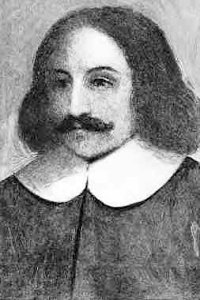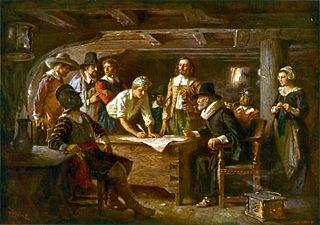
John Alden was a crew member on the historic 1620 voyage of the Mayflower which brought the English settlers commonly known as Pilgrims to Plymouth Colony in present-day Massachusetts, US. He was hired in Southampton, England, as the ship's cooper, responsible for maintaining the ship's barrels. Although he was a member of the ship's crew and not a settler, Alden decided to remain in Plymouth Colony when the Mayflower returned to England. He was a signatory to the Mayflower Compact.

The Pilgrims, also known as the Pilgrim Fathers, were the English settlers who came to North America on the Mayflower and established the Plymouth Colony in what is today Plymouth, Massachusetts, named after the final departure port of Plymouth, Devon. Their leadership came from the religious congregations of Brownists, or Separatist Puritans, who had fled religious persecution in England for the tolerance of 17th-century Holland in the Netherlands.

Plymouth Colony was an English colonial venture in America from 1620 to 1691 at a location that had previously been surveyed and named by Captain John Smith. The settlement served as the capital of the colony and developed as the town of Plymouth, Massachusetts. At its height, Plymouth Colony occupied most of the southeastern portion of Massachusetts.

William Bradford was an English Puritan separatist originally from the West Riding of Yorkshire in Northern England. He moved to Leiden in Holland in order to escape persecution from King James I of England, and then emigrated to the Plymouth Colony on the Mayflower in 1620. He was a signatory to the Mayflower Compact and went on to serve as Governor of the Plymouth Colony intermittently for about 30 years between 1621 and 1657. His journal Of Plymouth Plantation covered the years from 1620 to 1646 in Plymouth.

John Carver was one of the Pilgrims who braved the Mayflower voyage in 1620 which resulted in the creation of Plymouth Colony in America. He is credited with writing the Mayflower Compact and was its first signer, and he was also the first governor of Plymouth Colony.

William Brewster was an English official and Mayflower passenger in 1620. In Plymouth Colony, by virtue of his education and existing stature with those immigrating from the Netherlands, being a Brownist, Brewster became senior elder and the leader of the community.

Boston Guildhall is a former municipal building in Boston, Lincolnshire. It currently serves as a local museum and also as a venue for civil ceremonies and private functions. It is a Grade I listed building.

Christopher Martin and his family embarked on the historic 1620 voyage of the Pilgrim ship Mayflower on its journey to the New World. He was initially the governor of passengers on the ship Speedwell until that ship was found to be unseaworthy, and later on the Mayflower, until replaced by John Carver. He was a signatory to the Mayflower Compact. He and his family all perished in the first winter at Plymouth Colony.
Robert Cushman (1577–1625) was an important leader and organiser of the Mayflower voyage in 1620, serving as Chief Agent in London for the Leiden Separatist contingent from 1617 to 1620 and later for Plymouth Colony until his death in 1625 in England. His historically famous booklet titled 'Cry of a Stone' was written about 1619 and finally published in 1642, many years after his death in 1625. The work is an important pre-sailing Pilgrim account of the Leiden group's religious lives.
The Brownists were a group of English Dissenters or early Separatists from the Church of England. They were named after Robert Browne, who was born at Tolethorpe Hall in Rutland, England, in the 1550s. A majority of the Separatists aboard the Mayflower in 1620 were Brownists, and indeed the Pilgrims were known into the 20th century as the Brownist Emigration.

Isaac Allerton Sr., and his family, were passengers in 1620 on the historic voyage of the ship Mayflower. Allerton was a signatory to the Mayflower Compact. In Plymouth Colony he was active in colony governmental affairs and business and later in trans-Atlantic trading. Problems with the latter regarding colony expenditures caused him to be censured by the colony government and ousted from the colony. He later became a well-to-do businessman elsewhere and in his later years resided in Connecticut.

John Robinson (1576–1625) was the pastor of the "Pilgrim Fathers" before they left on the Mayflower. He became one of the early leaders of the English Separatists, or Brownists, and is regarded as one of the founders of the Congregational Church.
Richard Clyfton (Clifton) was an English Brownist minister, at Scrooby, Nottinghamshire, and then in Amsterdam.

John Tilley and his family were passengers on the historic 1620 voyage of the Mayflower. He was a signatory to the Mayflower Compact, and died with his wife in the first Pilgrim winter in the New World.

Mayflower was an English ship that transported a group of English families, known today as the Pilgrims, from England to the New World in 1620. After a grueling 10 weeks at sea, Mayflower, with 102 passengers and a crew of about 30, reached America, dropping anchor near the tip of Cape Cod, Massachusetts, on November 21 [O.S. November 11], 1620.
The Scrooby Congregation were English Protestant separatists who lived near Scrooby, on the outskirts of Bawtry, a small market town at the border of South Yorkshire, Lincolnshire and Nottinghamshire. In 1607/8 the Congregation emigrated to the Netherlands in search of the freedom to worship as they chose. They founded the "English separatist church at Leiden", one of several English separatist groups in the Netherlands at the time.
George Morton or George Mourt was an English Puritan Separatist. He was the publisher of, and perhaps helped write, the first account in Great Britain of the founding of Plymouth Colony, called Mourt's Relation.

First Parish Church in Plymouth is a historic Unitarian Universalist church at the base of Burial Hill on the town square off Leyden Street in Plymouth, Massachusetts. The congregation was founded in 1620 by the Pilgrims in Plymouth. The current building was constructed in 1899.

In the early 17th century, thousands of English Puritans colonized North America, mainly in New England. Puritans were generally members of the Church of England who believed that the Church of England was insufficiently reformed, retaining too much of its Roman Catholic doctrinal roots, and who therefore opposed royal ecclesiastical policy under Elizabeth I of England, James I of England, and Charles I of England. Most Puritans were "non-separating Puritans" who did not advocate setting up separate congregations distinct from the Church of England; these were later called Nonconformists. A small minority of Puritans were "separating Puritans" who advocated setting up congregations outside the Church. The Pilgrims were a Separatist group, and they established the Plymouth Colony in 1620. Non-separating Puritans played leading roles in establishing the Massachusetts Bay Colony in 1629, the Saybrook Colony in 1635, the Connecticut Colony in 1636, and the New Haven Colony in 1638. The Colony of Rhode Island and Providence Plantations was established by settlers expelled from the Massachusetts Bay Colony because of their unorthodox religious opinions. Puritans were also active in New Hampshire before it became a crown colony in 1691.
Thomas Cushman (1607/8–1691) was a leader in Plymouth Colony, New England.















